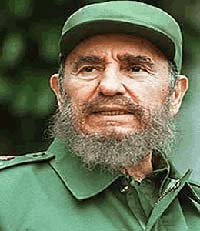Castro publishes article criticizing U.S. environmental policies
Ailing leader Fidel Castro published an article in state media Thursday criticizing U.S. environmental policies, emerging from months of silence on political matters during his long recuperation from intestinal surgery in an apparent move to reassert his voice on international issues.

"Condemned to premature death by hunger and thirst more than 3 billion people of the world," read the headline in Castro's article in the Communist Party daily Granma, which asserted that U.S. President George W. Bush's support of using crops to produce ethanol for automobiles in rich nations could deplete food stocks in developing countries.
"This isn't an exaggerated number; it is actually cautious," read the article signed by Castro and distributed via electronic mail to international correspondents by foreign ministry officials in the early hours of Thursday before it was posted on the Granma web site.
Castro wrote that during a Monday meeting between the U.S. president and American automobile manufacturers, "The sinister idea of converting food into combustibles was definitively established as the economic line of the foreign policy of the United States."
The article was written in the same kind of apocalyptic style Castro traditionally has used when discussing the impact of U.S. international policies on developing nations, and there was no reason to doubt that the ailing 80-year was its author.
As in some shorter messages signed by Castro in the eight months since he fell ill, the article did not seem aimed at dispelling rumors about his health, but rather at drawing attention to his stand on world affairs.
It was unclear what the message meant in terms of Castro's future role in domestic affairs, which he turned provisionally over to his 75-year-old brother Raul, the defense minister, on July 31 when he announced he had undergone intestinal surgery. In recent weeks, Bolivian President Evo Morales and several senior Cuban officials have indicated that Castro could soon take a more active role in public affairs, and could even return to the presidency.
There has is a growing expectation on the island that he could soon make his first public appearance since falling ill. Morales recently said from Bolivia that he expects to see Castro in public on April 28 during a meeting in Havana with regional presidents celebrating a regional trade and cooperation pact called the Bolivarian Alternative for the Americas.
Castro's condition and his exact ailment are a state secret but he is widely believed to suffer from diverticular disease, which causes a weakening in the walls of the colon.
Ramon Castro told reporters Wednesday that his younger brother Fidel was doing very well, but the 82-year-old jokingly dodged reporters' questions about whether the leader would soon appear in public. "He's in one piece," Ramon Castro said of Fidel as he toured a cattlemen's fair and rodeo. "These Castros are strong!"
In his Thursday article, Fidel Castro quotes extensively from a Washington-datelined story by The Associated Press reporting on the Monday meeting between Bush and U.S. automakers and their comments about using corn to create ethanol as an alternative to fossil fuels.
The Cuban leader noted that Cuba has also experimented with extracting ethanol from sugarcane.
But if rich nations decide to import huge amounts of traditional food crops such as corn from developing countries to help meet their energy needs, it could have disastrous consequences for the world's poor, Castro wrote.
"Apply this recipe to the countries of the Third World and you will see how many people among the hungry masses of our planet will no longer consume corn," the article said. "Or even worse: by offering financing to poor countries to produce ethanol from corn or any other kind of food no tree will be left to defend humanity from climate change."
Subscribe to Pravda.Ru Telegram channel, Facebook, RSS!


